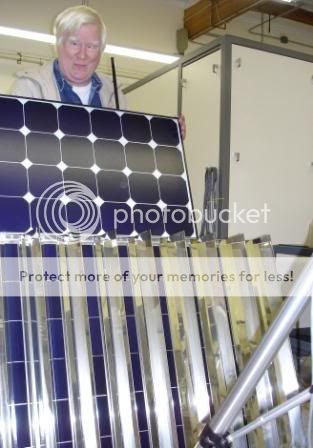Cheap, Superefficient Solar
"Solar-power modules that concentrate the power of the sun are becoming more viable.
Technologies collectively known as concentrating photovoltaics are starting to enjoy their day in the sun, thanks to advances in solar cells, which absorb light and convert it into electricity, and the mirror- or lens-based concentrator systems that focus light on them. The technology could soon make solar power as cheap as electricity from the grid.
The idea of concentrating sunlight to reduce the size of solar cells--and therefore to cut costs--has been around for decades. But interest in the technology has picked up in the past year. Last month, Japanese electronics giant Sharp Corporation showed off its new system for focusing sunlight with a fresnel lens (like the one used in lighthouses) onto superefficient solar cells, which are about twice as efficient as conventional silicon cells. Other companies, such as SolFocus, based in Palo Alto, CA, and Energy Innovations, based in Pasadena, CA, are rolling out new concentrators. And the company that supplied the long-lived photovoltaic cells for the Mars rovers, Boeing subsidiary Spectrolab, based in Sylmar, CA, is supplying more than a million cells for concentrator projects, including one in Australia that will generate enough power for 3,500 homes."
http://www.technologyreview.com/read_article.aspx?id=17774&ch=energy
"Solar-power modules that concentrate the power of the sun are becoming more viable.
Technologies collectively known as concentrating photovoltaics are starting to enjoy their day in the sun, thanks to advances in solar cells, which absorb light and convert it into electricity, and the mirror- or lens-based concentrator systems that focus light on them. The technology could soon make solar power as cheap as electricity from the grid.
The idea of concentrating sunlight to reduce the size of solar cells--and therefore to cut costs--has been around for decades. But interest in the technology has picked up in the past year. Last month, Japanese electronics giant Sharp Corporation showed off its new system for focusing sunlight with a fresnel lens (like the one used in lighthouses) onto superefficient solar cells, which are about twice as efficient as conventional silicon cells. Other companies, such as SolFocus, based in Palo Alto, CA, and Energy Innovations, based in Pasadena, CA, are rolling out new concentrators. And the company that supplied the long-lived photovoltaic cells for the Mars rovers, Boeing subsidiary Spectrolab, based in Sylmar, CA, is supplying more than a million cells for concentrator projects, including one in Australia that will generate enough power for 3,500 homes."
http://www.technologyreview.com/read_article.aspx?id=17774&ch=energy






